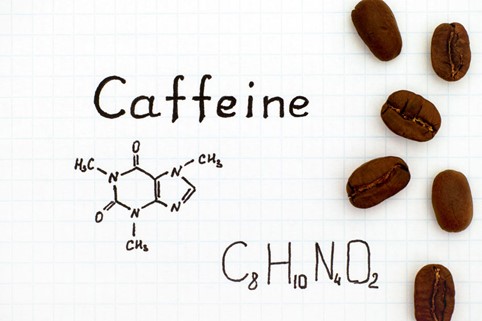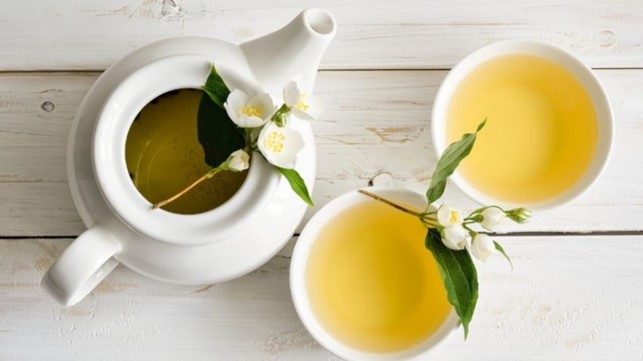- Almost all teas contain 15-70 mg of caffeine per cup;
- Coffee averages 80-135 mg of caffeine per cup;
- It is only a belief that claims that green tea and white tea have lower levels of caffeine than black tea;

Caffeine is a natural stimulant found in many plants.
Caffeine dissolves in water and is transferred into the cup where the infusion takes place when making tea, coffee or other beverages containing it. The most known plants which contain caffeine are tea (Camellia sinensis), coffee and yerba maté. Caffeine in tea is properly theine and its effect is somehow different than the one contained in coffee. This is what we are going to talk about today.
Although tea has numerous health benefits, immoderate consumption of beverages containing caffeine has unpleasant and negative effects that affect our state of health and lead to anxiety and insomnia, for this reason, many tea drinkers try to moderate their caffeine intake. The amount of caffeine contained in tea tends to be low, but it is enough to cause concern among those who consume large amounts of tea and those who are more sensitive to caffeine for health reasons.
A cup of coffee can stun your nervous system. It will not be kind to you; it will take effect immediately. After two or three minutes, your heart rate will increase. Almost immediately, you will feel uplifted in spirit. And your brain activity will be affected. You will have the desire to do things. Your face will glow. The effect is therefore powerful and brief. After half an hour you will return to your previous energy level, so after a while you will want to drink some more. This is the effect of coffee.
Tea is different. The effect of theine lasts longer and acts more slowly. It will cheer you up almost imperceptibly, so much so that it will be difficult to notice the moment it enters your bloodstream. It doesn’t rush. It does not stun. It doesn’t excite. It dances! And it does so with great grace and respect. Its effect lasts for many hours and when it passes, it’s like landing softly. I would call it a therapeutic approach.
How much caffeine is in a cup of tea?
The presence of caffeine varies from one type of tea to another and also depends on the type of infusion, but on average it is between 15 and 70 mg per in a cup. Caffeine can also be measured in milligrams per gram of tea. A tablespoon of dry tea leaves weighs about 2.5 grams and is the amount it usually takes to make one cup, although it depends on the type of tea. A study about the caffeine contained in tea found that the amount present varies from 3 mg/g to 30 mg/g, this means having a cup with 7.5 mg of caffeine and 75 mg of tea. In most cases, tea has much less caffeine than coffee; in fact, one cup of coffee contains 80-135 mg.
It is important to understand that these figures refer to quantities per cup and not per serving, therefore in case of large quantity tea services or with espresso or other beverages containing a lot of caffeine, the substance present could be much higher. In the United States, the standard size for the “small” serving is 12 ounces. A study of the coffee trade in Australia found that more than a quarter of espresso samples contained more than 120 mg of caffeine, and more than an eighth contained 167 mg, but the highest contained 214 mg. The authors of the research concluded that the presence of caffeine in beverages is almost always underestimated compared to what actually happens.
How much caffeine can you consume?
To read these numbers in perspective, in the American Congress, the current board of obstetricians and gynecologists advocates that it is healthy for pregnant women to consume a maximum of 200 mg of caffeine per day[2]. For the general public, the Mayo Clinic recommends a daily consumption of 200-300 mg and warns of the health risks to which consumption of 500-600 mg per day can lead[3]. People with liver problems or those taking medications that inhibit the CYP1A2 enzyme should consume even less. If you drink a strong tea with 60 mg of caffeine per cup, a consumption of 8 cups per day is recommended, 3 for pregnant women. For milder teas, with 30 mg per cup, it is permissible to even double consumption.
We are all different and our reaction to caffeine is also different, if for some a certain amount can be pleasant, for others it could be harmful. Pay attention!
How much caffeine do green, white, and black teas contain?
Many tea companies, as well as other reputable bodies such as the United States Department of Agriculture, have made misleading generalizations about the caffeine content of different types of tea. It is a widespread myth that black tea has more caffeine than green tea, as well as one that claims white tea contains the least caffeine overall. A 2005 study published in the Journal of Food Science listed the caffeine content of 77 types of tea and found a large caffeine content in both green and black teas[4]. And surprisingly, the tea in this research found to have the most caffeine of all was actually a white tea, thus disproving the previously mentioned myth.
Leaves, stems and buds, where is caffeine found? Tea can be composed of different parts of the tea plant and these contain different amounts of caffeine. Younger leaves and buds contain higher doses than older, more mature leaves[7]. In fact, for the tea plant, caffeine acts as a natural insecticide to prevent insects from eating it. Young sprouts and leaves are the most subject to the attacks of these animals, therefore they are richer in caffeine; older leaves are instead more resistant and therefore the level of the substance is lower. Teas made with sprouts, such as Yunnan Gold or Silver Needle White Tea (Bai Hao Yinzhen) therefore have higher rates of caffeine than teas made with broad leaves.
Is it possible to “decaffeinate” our tea by steeping it a little in water?
Short answer: no. Many people claim that you can “decaffeinate” tea by making short brews in water and throwing away the result. Unfortunately, this process doesn’t work; otherwise, companies wouldn’t have invested capital to pursue complex processes to produce decaffeinated tea. Caffeine tends to diffuse into hot water in the same way that the chemicals that give flavor and aroma to tea do, so if it still tastes good after tea infusions, it probably still contains caffeine.
Almost all herbal teas do not contain caffeine
Although caffeine is present in a number of plants, the vast majority of herbal teas are caffeine-free. The most notable exception is yerba mate. Other plants that contain caffeine are rare as ingredients in herbal teas; these plants include guayusa, yaupon, and guarana. In addition to exploring other herbal teas, people who want caffeine-free tea-like drinks may want to try South African rooibos and honeybush, two plants that are often described as similar to tea in flavor, health benefits, and mode of production.
How much caffeine is too much caffeine?
Caffeine has its merits, too, but it can cause problems. Find out how much you can consume and if you should limit your use.
If you rely on caffeine to wake you up or to get through the day, you’re not alone. Caffeine is used by millions of people every day to increase concentration and relieve faic.
For most healthy adults, it is normal to consume 400 mg of caffeine per day. That’s the amount of caffeine contained in four cups of coffee, 10 cans of coke or two energy drinks. Caffeine use is appropriate for adults, but not for children. Adolescents should limit themselves to no more than 100 mg per day.
Among adults, excessive consumption can have unwanted effects and may not be a good idea for those who are very sensitive to caffeine or take certain medications. Read on to find out if you should limit or stop your caffeine consumption routine.
If you drink too much tea, what can happen?
Excessive consumption of caffeine, more than 500-600 mg per day, may cause undesirable effects:
- Insomnia
- Nervousness
- Restlessness
- Irritability
- Stomachache
- Accelerated heartbeat
- Muscle tremor
- Just a little makes you nervous
Some people are more sensitive to caffeine than others. If you are, even a small amount – even a cup of coffee or tea – could cause unwanted effects, such as restlessness and other problems.
Your reaction to caffeine can be determined by the amount of caffeine you are used to drinking. Those who are not used to it suffer it more and will suffer negative effects. Other factors may include body mass, age, medical treatments, health conditions and anxiety issues. Research also suggests that men are more susceptible to the effects of caffeine than women.
Sources:
https://pubmed.ncbi.nlm.nih.gov/17412475/
https://academic.oup.com/jat/article/32/8/702/829967?login=true
https://camellia-sinensis.com/en/analysis-of-antioxydants
https://pubmed.ncbi.nlm.nih.gov/12643643/



